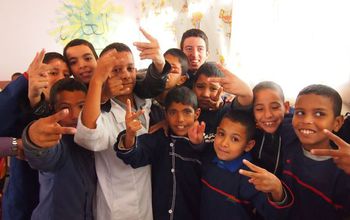
Research News
Research helps young children ‘hack’ their own mobility solutions
March 30, 2016
Infants constantly explore their environments, toddling and crawling around while at the same time laying the cognitive foundation that they’ll use for learning later in life. But how can parents and doctors foster that kind of development in infants with mobility issues?
A research team at the University of Delaware (UD) is working on a solution that’s proven promising — and adorable.
The work — led by physical therapy professor James Cole Galloway and supported by the National Science Foundation (NSF) Social, Behavioral and Economic Sciences Directorate — puts infants and young children with special needs in sophisticated mobility solutions that just happen to look like brightly colored race cars and cartoon characters.
Galloway says the key to the approach used in this research is that it allows children to “hack” their mobile robots based on what they can do. If a child can move his head, designers and parents can customize a headrest-mounted switch that controls acceleration or steering. If another needs specific supports, designers can cobble together a study solution made of plastic pipes. Buttons that can make these four-wheeled robots go, stop and change direction are available in different configurations and can be easily relocated.
The researchers’ NSF-supported work has investigated infants’ capacity to steer the mobility devices, finding they were able to do so before they could crawl or walk, and explored ways to use the technology therapeutically for children too young for power wheelchairs. The team is now determining whether early mobility helps advance early social behavior among infants. The goal is to help infants with mobility issues take part in another activity that has profound developmental implications — social playtime.
—
Robert J. Margetta,
(703) 292-2663 rmargett@nsf.gov
Investigators
Sunil Agrawal
James Galloway
Related Institutions/Organizations
University of Delaware
Related Programs
Developmental and Learning Sciences
Related Awards
#1252876 ROBOT ENHANCED MOBILITY II: THE EMERGENCE OF MOBILITY AND SOCIALIZATION IN YOUNG CHILDREN
#0745833 Robot Enhanced Mobility: The Capacity for Your Infants to Learn Real World Navigation, and its Effect on Perception, Action and Cognition Development
Total Grants
$839,908
Source: NSF News
Brought to you by China News







